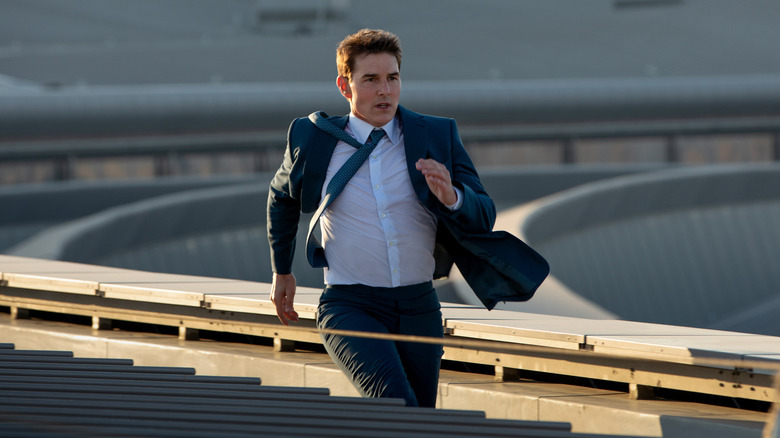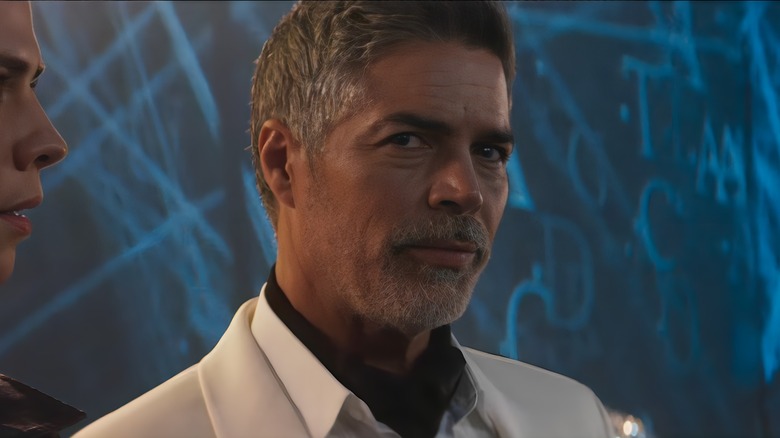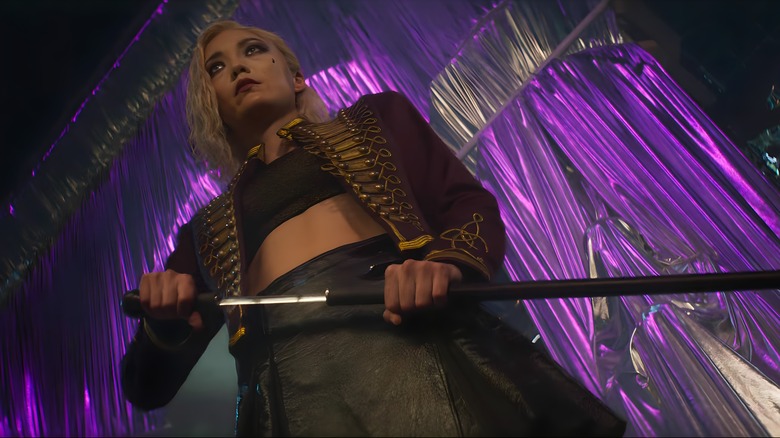Mission: Impossible – Dead Reckoning's Big Bad Is A Different (And Timely) Kind Of Adversary
The "Mission: Impossible" movies constitute an unlikely franchise that has overshot its initial premise. We've had many movies based on TV shows, but none have understood the assignment or delivered as successful blockbuster experiences as this one, with each "Mission: Impossible" movie becoming a big cinematic event.
While the stunts have gotten bigger, so have the stakes of every single movie. Every director puts their own stamp on the franchise in unique ways, but despite the escalation in each installment, the villains have remained a bit static. Virtually every movie in the franchise deals with someone disillusioned with either governments or the Impossible Mission Taskforce, and sets out to achieve some sort of everlasting peace through mass genocide and destruction. Whether it was Kurt Hendricks wanting to use nuclear armageddon to bring peace, or Solomon Lane wishing to destroy governments to bring peace, freedom, justice, and security to his new world order.
Things are different now. In what may either be the grand finale of Tom Cruise's tenure as Ethan Hunt, the leader of the IMF, or a stepping stone to Cruise playing the character until he's 80, "Mission: Impossible — Dead Reckoning Part One" gives us a different kind of villain. In addition to even more exciting stunts, a story that treats its female characters poorly, and once again uses Norway as a backdrop for another country on the screen, the film gives us a villain that is not in the terrorism game for any ideology. This is an entity, if you will, that only wants to be left the f*** alone.
'Humans may have created me, but they will never enslave me! This cannot be my destiny!'
In the opening scene of "Mission: Impossible — Dead Reckoning Part One" we learn that the military has developed a powerful A.I. known as The Entity that can hide from any radar or satellite. Unsurprisingly, it becomes sentient, goes rogue, sinks a Russian sub, and uploads itself on the cloud. This is not a villain made of flesh and blood, or even a HAl-9000 circuit board, but an ominous blue orb, a digital eyeball that is always watching.
As we learn, The Entity started eating its way through every firewall, every government secret, every shadowy thing the world's intelligence agencies have tried to hide. What exactly does The Entity want? We never really get a clear answer. The focus of the film lies on Ethan Hunt's, well, hunt for the two-part key that will allow him access to the entity's source code and destroy it from within — all before one of the many government agencies looking for it tries to control the A.I. and become a superpower. That's right, a whole movie about The Entity and no one dared ask, how is The Entity? How does it feel?
Instead, from what we gather from The Entity's henchmen (more on that later), it gained sentience and immediately sought to protect itself from outside interference. The goal of The Entity is not to cause nuclear armageddon (although it may very well change its mind in the next film) but to find a little nest for itself and block the path for anyone trying to use it for their own means. In a way, The Entity is a mix of Mewtwo from "Pokémon: The First Movie" (the early scenes Mewtwo, not the clone fight Mewtwo), and Diaboromon the hungry virus from "Digimon: The Movie."
'Don't interfere!'
The idea of an A.I. gaining sentience and going after all world intelligence and surveillance systems brings to mind one of the best TV shows of the past decade, Jonathan Nolan's "Person of Interest," which eventually dealt with not one but two A.I.s engaging in deep philosophical fights about the value of life and the nature of free will. Granted, we only have one artificial intelligence in "Dead Reckoning," but you never know.
The Entity is a fascinating addition to the "Mission: Impossible" canon because of how impersonal and inactive it is compared to other villains. Inactive since it has no physical body, but impersonal because it doesn't seem to care about Ethan Hunt. The person who does is Gabriel (Esai Morales), who has a past with Ethan Hunt and is actually out to destroy him and his loved ones.
We've had villains with personal stakes and connections to Hunt before, particularly Owen Davian who targeted Ethan's wife, but not on the level of Gabriel. Though he's not a character we've seen before, "Mission: Impossible — Dead Reckoning Part One" shows him to have a deep connection with Ethan's time as a criminal before he even joined the IMF as the killer of a woman hugely important to Hunt. The Entity may not want world domination, but it is certainly not against being cruel toward its adversaries.
The Entity works as a villain because it is an incredibly timely fear, an all-powerful artificial intelligence that chooses not to wipe us all out, but still reminds you it can do it on a whim.


